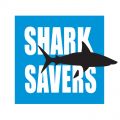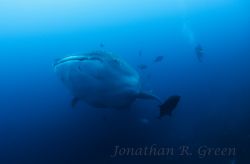For Immediate Release
Galapagos, Ecuador - Sharks have been proven to be more valuable alive in many ecotourism destinations worldwide, when compared to the short-term gain of a fisheries’ kill. Now, Shark Savers and the Charles Darwin Foundation (CDF) are joining forces to determine the value of living sharks to the Galapagos.
Galapagos is one of the few dive destinations in the world where divers can observe large schools of sharks, making the islands one of the most famous underwater destinations on the planet. Sharks not only play a positive role in keeping marine ecosystems healthy, but also help the local economy by attracting tourism.
The Galapagos National Park Service through the management of the Galapagos Marine Reserve has fully protected sharks for more than a decade; however, those who have dived in the Galapagos over the years report that some shark populations are declining inside the Reserve and there have been reports of poaching and shark finning.
“We are excited to be working with the Charles Darwin Foundation to assess the monetary value of living sharks for ecotourism, this may be the best way to keep sharks safe from extinction,” notes Manuel Wendt, Director of Shark Savers Germany. ”Similar studies in other parts of the world, including South Africa, Fiji, and Australia, have shown that the tourism revenue from observing sharks can be many times that of shark fishing revenue—and the tourism revenue is long-term, whereas you can only kill a fish once.”
 Shark Savers Germany, the German arm of the international conservation organization, Shark Savers, is supporting the Charles Darwin Foundation(CDF), the Galapagos National Park Service and the University of California-Davis in a multi-institutional campaign to measure the monetary benefit that living sharks bring to the Galapagos economy.
Shark Savers Germany, the German arm of the international conservation organization, Shark Savers, is supporting the Charles Darwin Foundation(CDF), the Galapagos National Park Service and the University of California-Davis in a multi-institutional campaign to measure the monetary benefit that living sharks bring to the Galapagos economy.
Johanna Zimmerhackel, a scientific Board member of Shark Savers Germany and volunteer marine biologist for CDF, will conduct the effort to obtain and analyze the tourism income sharks bring to the local Galapagos economy. “I am excited to contribute to this important work,” says Johanna, “I cannot wait for the results of our work, because this will not only help understanding sharks in the Galapagos, but also help to save these fabulous animals all over the world”.
Johanna will be working with dive operators, tourists and the local government, to obtain and evaluate shark-related income. She will also be diving to help assess shark populations around the archipelago. This information will be used by the Galapagos National Park Service to implement management techniques for their resident sharks.
"Galapagos is a treasure," says project leader Cesar Peñaherrera from the CDF. "We have this unique opportunity to show both locals and visitors how important sharks are for Galapagos for both their ecological value and their benefit to the local economy. I believe that anything we can do to help sharks is worth the effort!"
Tens of millions of sharks are killed each year, with much of the demand due to shark fin soup. Considered a luxury item served at weddings and corporate events, the fins can fetch up to US$181 per pound. Worldwide, many shark populations have declined by as much as 90% or more and all of the species most prevalent in the shark fin trade are listed as threatened with or vulnerable to extinction by the International Union for Conservation of Nature (IUCN). As shark populations collapse, fishing revenue derived from the sharks also disappears. In contrast, diving with sharks not only provides revenue to the dive industry but also indirectly to many other sectors through tourist spending e.g. food, accommodation and transport—year after year.
About The Charles Darwin Foundation
The Charles Darwin Foundation for the Galapagos Islands (CDF) is an international not-for-profit organization that provides scientific research and technical information and assistance to ensure the proper preservation of the Galapagos Islands. CDF carries out its activities in Galapagos under a conservation research and guidance agreement with the Ecuadorian government. The Foundation is part of a network of local and national organizations supporting Galapagos Island protection. For over fifty years, CDF has worked closely with the Galapagos National Park Service (GNPS), the main government authority overseeing the safeguarding of the islands’ natural resources, providing the results of scientific research to conserve this living laboratory. For more information visit http://www.darwinfoundation.org or for up-to-the-minute project updates, visit their Facebook page: http://www.facebook.com/darwinfoundation
About Shark Savers: Shark Savers Germany is the European arm of Shark Savers, addressing the German-speaking countries of Germany, Austria and Switzerland. Shark Savers is dedicated to saving sharks and mantas through building awareness, education, and action. Focusing on action and results, Shark Savers’ programs result in more protections for sharks and mantas, locally and globally. By leveraging broad professional experience and ocean expertise, Shark Savers brings this important issue to the public in many compelling forms, motivating people to stop consuming sharks and shark fin soup, working for the creation of shark sanctuaries, and empowering divers as advocates and citizen scientists for sharks. For more information: www.sharksavers.orgInformation in German and the ability to donate to this project may be found at www.sharksavers.org/de or www.facebook.com/sharksaversgermany germany@sharksavers.org